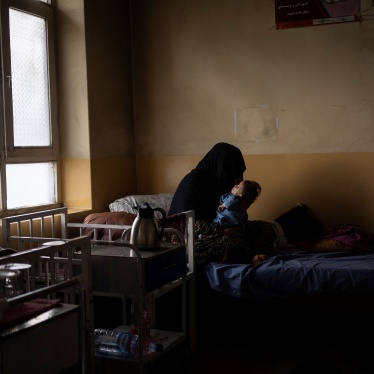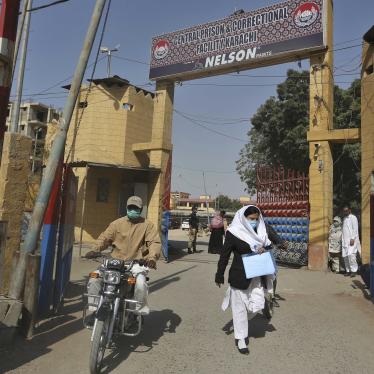(New York) - Donors assisting in Burma’s reconstruction after Cyclone Nargis should ensure that aid reaches the Burmese people, and is not manipulated by its repressive government, Human Rights Watch said today in an open letter to donors. The devastating cyclone that struck southern Burma on May 2-3 directly affected approximately 2.4 million people, with 140,000 killed or listed as missing.
The Tripartite Core Group (TCG) – comprising the Association of Southeast Asian Nations (ASEAN), the United Nations and the Burmese ruling State Peace and Development Council (SPDC) – completed its needs assessment of the affected areas and presented its findings at a meeting in Singapore on July 21. The total cost of relief and reconstruction was estimated at US$1 billion. On July 10, a Revised Flash Appeal in New York called for international donations to rise from an initial estimate of US$201 million to US$481 million.
“The world reacted admirably to help people affected by the cyclone, so it’s important that this assistance is sustained to help rebuild communities,” said Brad Adams, Asia director at Human Rights Watch. “But assistance must be provided in line with normal international standards, which the Burmese military regime government has long refused to accept.”
Human Rights Watch has long supported increased humanitarian aid to Burma so long as it is properly distributed to the people in need. However, the Burmese government has long limited access and monitoring of aid, making it difficult for donors to give and agencies to operate in the country.
Following the cyclone, international efforts to assist the victims have been hampered by the ruling SPDC. Despite promises to the UN and international relief organizations, travel by foreign staff to affected areas continues to be limited, thousands of civilians have been forcibly relocated throughout affected areas, and local communities have been obstructed from providing aid. Some Burmese who have provided aid have been arrested by authorities.
Ten weeks after the cyclone, the UN estimates that there are still large numbers of people not receiving aid and continuing to face food shortages, shelter needs, lack of basic sanitation, and grave psychological consequences.
“For many years, Burma’s generals have hindered rather than helped the delivery of aid,” said Adams. “Basic principles should be agreed by donors, and they must press the government to adhere to them every step of the way.”
In the letter, Human Rights Watch set out 10 basic principles:
- Insist that the continuing humanitarian needs of the affected population are immediately addressed;
- Insist on unimpeded humanitarian access for local and international humanitarian organizations to the affected population to determine reconstruction needs;
- Ensure that all internationally funded reconstruction activities be conducted by independent humanitarian and development organizations, rather than by providing funding directly to the Burmese government, and that local participation be monitored by the donor;
- Monitor reconstruction efforts to deter previously documented human rights abuses, such as forced labor, forced relocation, and land seizure;
- Consult with affected communities, ethnic minorities, religious communities, and a broad range of civil society groups when considering, designing, and implementing reconstruction projects;
- Do not award contracts for reconstruction projects to any Burmese company or individual under international sanctions, or with companies owned or controlled by the Burmese military;
- Provide humanitarian and reconstruction aid on the basis of need, and guard against government discrimination on the basis of ethnicity, religion, perceived political affiliation, or other basis;
- Before committing to reconstruction projects, require that the Burmese government, which has an estimated US$3.5 billion in foreign reserves and receives an estimated US$150 million in monthly gas exports revenues, formally commit to making a significant contribution to reconstruction efforts;
- Use reconstruction projects to promote respect for human rights in Burma; and
- Establish an Independent Monitoring Body.
“Because of the complex and exceptional challenges faced by the donor community in funding, implementing, and monitoring humanitarian and reconstruction projects in Burma, donors should establish an ‘Independent Monitoring Body,’” said Adams. “This body should be co-managed by the donor community and the United Nations to ensure the integrity of the reconstruction and humanitarian effort, and to provide transparency and accountability in the effort.”
Photo Slideshow of Cyclone Devastation and Ineffectual Response
In June and July 2008, Human Rights Watch was able to document in photographs the massive destruction to shipping and infrastructure caused by the cyclone, the frustrated relief efforts, and the heavy security presence in the Irrawaddy Delta. These photos portray the extent of the devastation and the piecemeal government response which has made efforts by Burmese communities and international agencies more difficult.





